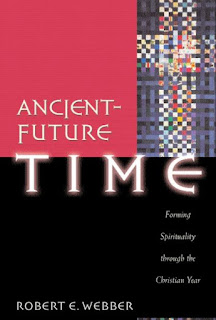Inhabiting the Christian Year: Advent
The Western Christian worship year begins with Advent---a season spanning the four Sundays prior to Christmas (in 2021 the first Sunday of Advent is November 28). Robert E. Webber, writing about the meaning of Advent in Ancient Future Time: Forming Spirituality through the Christian Year, shares this comment:
Advent is the time when God breaks in on us with new surprises and touches us with a renewing and restoring power. In Christian-year worship and spirituality we call upon God for a new breaking in, a fresh outpouring of his Spirit. (p. 38)The Advent Season is a powerful and important reminder that God is not remote, aloof or uninvolved. It tells us that God has come, is coming and will come again ("advent" means "coming"). This truth helps offset a message that is prevalent in our me-centered, self-sufficient, individualistic culture: I can do it on my own, thank you!
As shown below, the Year C Revised Common Lectionary (RCL) scripture readings include passages from the Old Testament book of Isaiah. The prophet Isaiah lived in the presence of God (e.g., Isa. 6:1, 3)---quite a contrast with how most people (Christians included) live life in a world where signs of God's glory are drowned out by the "noise" of everyday existence. Isaiah bids us look beyond what we normally focus on to see the presence of the Lord who judges us, heals us and restores us. What a powerful truth to remember as we begin a new worship year---a year of inhabiting and so being formed anew by the gospel story.
First Sunday of Advent
- Jeremiah 33:14-16
- Psalm 25:1-10
- 1 Thessalonians 3:9-13
- Luke 21:25-36
Second Sunday of Advent
- Baruch 5:1-9 or Malachi 3:1-4
- Luke 1:68-79
- Philippians 1:3-11
- Luke 3:1-6
Third Sunday of Advent
- Zephaniah 3:14-20
- Isaiah 12:2-6
- Philippians 4:4-7
- Luke 3:7-18
Fourth Sunday of Advent
- Micah 5:2-5a
- Luke 1:46b-55 or Psalm 80:1-7
- Hebrews 10:5-10
- Luke 1:39-55
As seen the list of RCL readings (above), Advent begins by looking forward to the promise of Jesus' return and his setting up of the fulness of the kingdom of God with a new heaven and new earth. It then continues with our rejoicing in the reality that Jesus, by the Spirit, is with us now, then concludes with the announcements of the Messiah's coming via the birth of the Christ child. Combined, these messages are about both anticipation (longing and hope) as well as the joy of fulfillment. We are reminded once again that Jesus will come, is coming and has come.
By starting the new worship year with the promise of Jesus' second coming, we begin with a time of great longing, hope and expectation concerning the final consummation of all that God has promised. We anticipate the time when all evil will be banished, and the earth will be restored to what is promised (e.g., Isa. 65 and Rev. 20-22). We begin with the realization that evil is doomed---that it has no future, as Webber notes:
The ultimate word in history is the triumph of God, the reign of God's kingdom, the eternal and lasting rule of the good.... We are promised that evil will be judged and done away with and all will be made whole. This is the vision we want to carry with us as we view the news and visit hospitals, psychiatric wards, and prisons of our world. Christian hope is an optimism about life that is grounded in Christ and celebrated again and again in the liturgy of the church. (p. 50)As noted above, Advent Season celebrations stop short of celebrating Jesus' birth. Instead there is a remembering of the promise of his birth---a sharing in Israel's longing for the Messiah's coming---in our case his coming at an even deeper level, by the Spirit, in our own lives, as Webber notes:
Because Advent is a time of longing for redemption, we should use the Advent season as a period to identify the matters from which we need to be redeemed. Identify whatever it is that seems to be holding you in its power... [then] commit it to the one who comes to set the prisoners free, turn it over to Christ in prayer, and ask the one who is to come into your life to take this problem up into himself. (p. 51).This is no idle exercise, for it reminds us precisely of what the incarnate Son of God accomplished by taking upon himself our diseased, sin-sick humanity and redeeming (healing) it. Advent is a time for us to be reminded of why the coming of Jesus is so important, to meditate on that in such a way that Christ is birthed anew in our hearts by the power of his indwelling Spirit. Advent is the season during which longing for and trust in Jesus is renewed, as Webber notes:
What is at stake during Advent is an assessment of our current state of faith and living and our commitment to keep on living in the hope to which we have been called. (p.52)Next time we'll look at Christmas Season, which begins on Christmas Day and extends for 12 days.
In the meantime, here are some videos related to Advent:
1. A song from Rich Mullins expressing the Advent longing for a deliverer:

